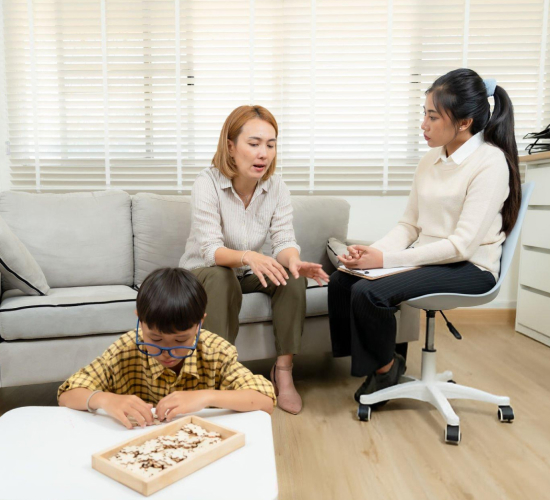

Attention-Deficit/Hyperactivity Disorder (ADHD) is a complex neurodevelopmental condition that affects millions of children and adults worldwide, presenting a unique set of challenges in daily life. While much focus is rightly placed on individuals living with ADHD and their experiences, the profound and often extensive impact it has on their primary ADHD caregiver often goes under-recognised and underestimated.
Being an ADHD caregiver is a demanding, yet incredibly rewarding role, one that requires immense patience, unwavering resilience, and a deep, empathetic understanding of the condition’s multifaceted nature. From navigating challenging behaviours and advocating for academic support to managing intense emotional regulation difficulties and maintaining positive family dynamics, the journey can feel overwhelming and isolating at times.
This comprehensive guide aims to equip every ADHD caregiver with essential knowledge about ADHD, provide practical, evidence-based strategies for daily management, and offer crucial insights into the vital importance of self-care, all tailored to the specific context and resources available in Malaysia. By demystifying ADHD and highlighting key areas of support, we hope to empower caregivers not only to foster an environment where individuals with ADHD can truly thrive and reach their full potential but also to safeguard their own invaluable mental and emotional well-being throughout this demanding journey.
ADHD is characterised by persistent patterns of inattention, hyperactivity, and impulsivity that interfere with functioning or development. It’s not a behavioural choice but a neurological difference in brain structure and function, affecting executive functions like planning, organising, managing time, and controlling impulses. These core symptoms manifest differently, leading to three main presentations:
It’s crucial to remember that ADHD symptoms are present across multiple settings (e.g., home, school, social situations) and are not simply a result of poor parenting or a lack of effort. They typically emerge in childhood and can persist into adolescence and adulthood.

Receiving an ADHD diagnosis, typically through a comprehensive assessment by paediatricians, psychiatrists, or specialist nurses, is often the first step towards understanding and support. It provides a framework for understanding the challenges and opens doors to appropriate interventions. Early intervention is crucial as it allows for the implementation of strategies that can significantly improve outcomes, both academically and socially. A timely diagnosis helps the ADHD caregiver understand that the behaviours are symptoms of a condition, not deliberate defiance, which can reduce parental blame and frustration.
Effective ADHD management usually involves a multi-modal approach, tailored to the individual’s specific needs and symptoms. For the ADHD caregiver, understanding these options is vital:
Supporting caregivers of children with ADHD means providing practical tools for everyday life. Here are some key strategies:
Being an ADHD caregiver presents a unique set of daily challenges that extend beyond typical parenting or caregiving duties. The fluctuating nature of symptoms, the intensity of emotional responses, and the constant need for supervision and redirection can lead to significant stress. Caregivers often contend with:
The constant demands of being an ADHD caregiver can lead to significant stress, anxiety, depression, and physical exhaustion, which is often termed ADHD caregiver burnout. Recognising the signs of burnout (e.g., chronic fatigue, irritability, feelings of hopelessness, withdrawing from social activities) is the first step towards addressing it. Preventing and managing burnout is not selfish; it’s essential for both the caregiver’s health and their ability to provide effective care.
No ADHD caregiver should feel alone, and building a robust support network is crucial for navigating the complexities of care. This network can comprise several key components.
There are numerous ADHD resources for caregivers available in Malaysia:
Being an ADHD caregiver is a profound and often challenging commitment, but it is also one filled with unique rewards. This guide has detailed how ADHD, a neurodevelopmental condition characterised by inattention, hyperactivity, and impulsivity, uniquely impacts caregivers, leading to potential ADHD caregiver burnout due to the complex demands of behavioural management, academic advocacy, and emotional support. However, by understanding the condition through diagnosis and multi-modal treatment approaches, including medication, behavioural therapy, and educational support, caregivers can gain crucial tools. Implementing effective daily strategies, such as establishing routines, using clear communication, and employing positive reinforcement, empowers caregivers to create a thriving environment for their children.
Ultimately, prioritising caregiver well-being through self-care, setting realistic expectations, and actively building a robust support network – including ADHD caregiver support groups and professional connections – is vital. By leveraging the extensive ADHD resources for caregivers available in Malaysia and engaging in advocacy, supporting caregivers of children with ADHD leads to greater confidence and success for the entire family. By embracing knowledge, implementing effective strategies, prioritising self-care, and building a strong support network, caregivers can transform daily struggles into opportunities for growth and resilience.
Understanding ADHD as a neurological condition, rather than a behavioural failing, is key to fostering empathy and developing effective interventions. Remember, your well-being as an ADHD caregiver is paramount – a well-supported caregiver is best equipped to provide the consistent, loving care that individuals with ADHD need to flourish.
Caregivers of children with ADHD can effectively manage daily challenges by implementing consistent and structured strategies such as:
• Establishing predictable routines for daily activities
• Clear and concise communication
• Positive reinforcement is key
• Breaking down overwhelming task into smaller, manageable steps
• Minimising distractions by creating a calm, organised space
• Prepare for transitions by providing warnings and clear instructions
• Teaching coping mechanisms for managing strong emotions
ADHD caregivers can avoid burnout by practicing self-care, setting realistic expectations, delegating and sharing responsibilities, seeking professional support, and building a robust support network.
There are numerous resources available for ADHD caregivers in Malaysia, including charities and organisations like ADHD Malaysia, SoulUp’s ADHD Parent Support Group, and Caregiver & Peer Support Group (CPSG) by Malaysian Mental Health Association (MMHA), online communities, books and websites, local services, and advocacy.
Sources:
Spread the love, follow us on our social media channels